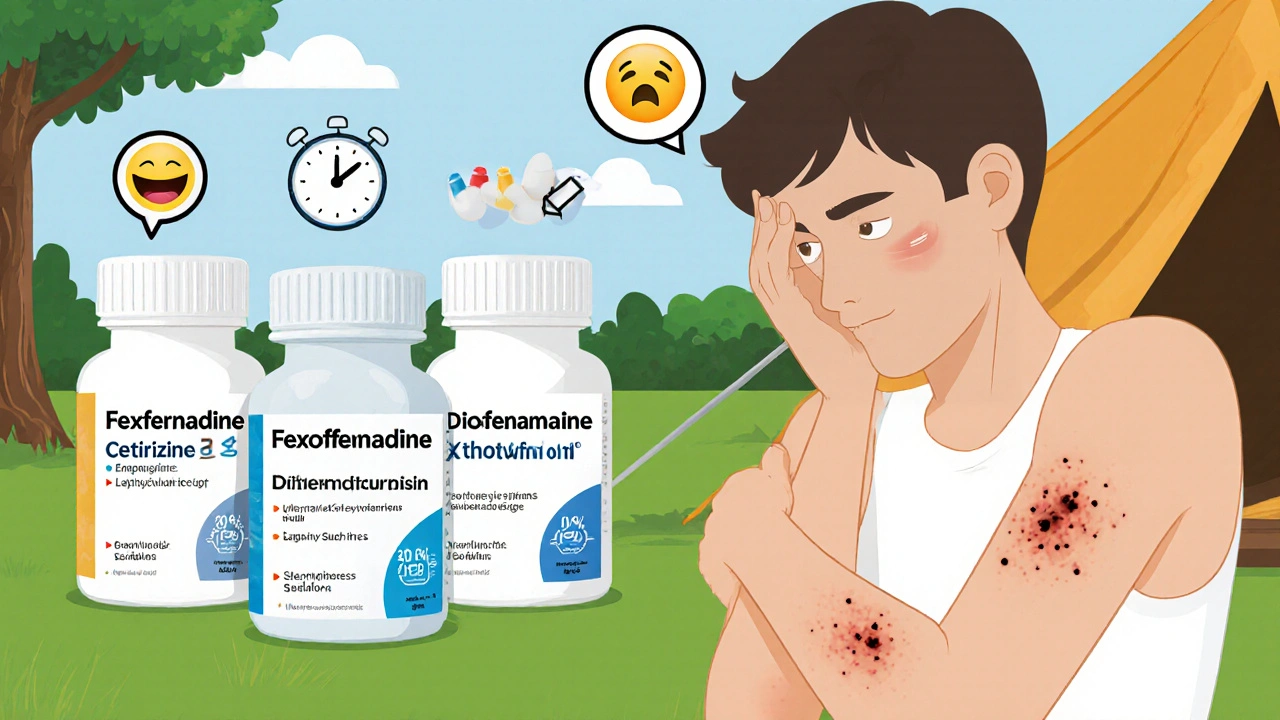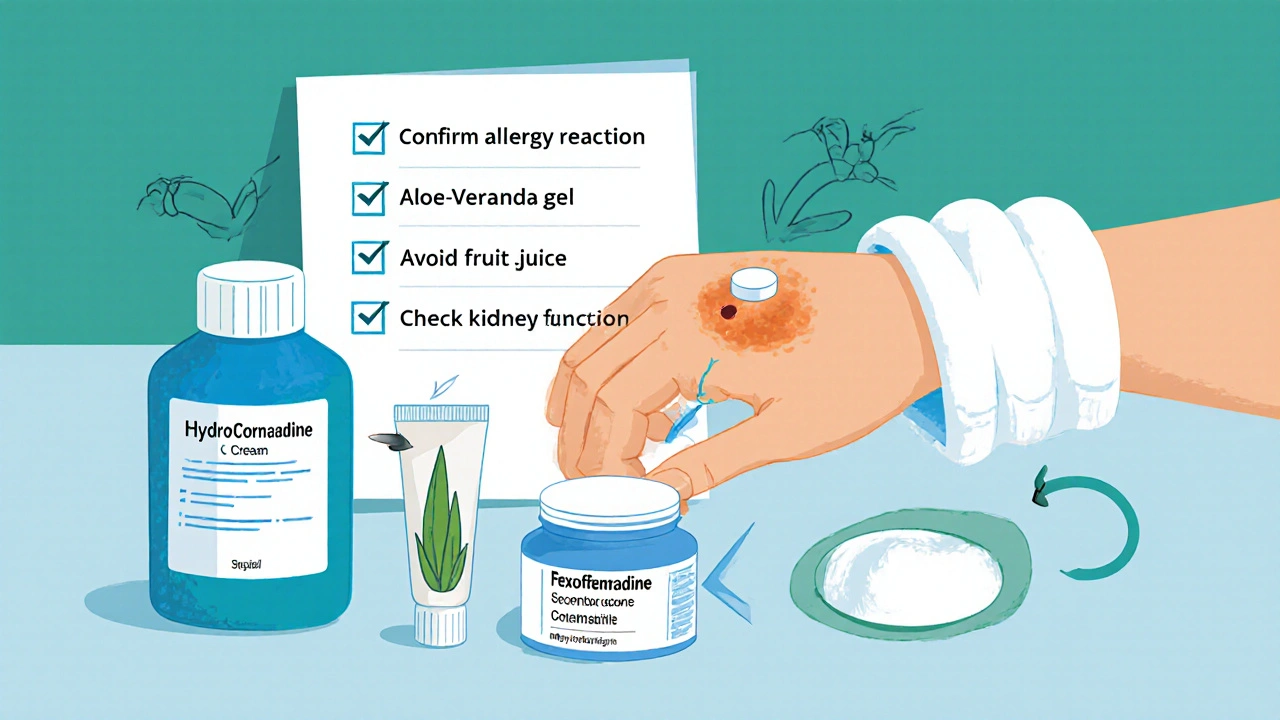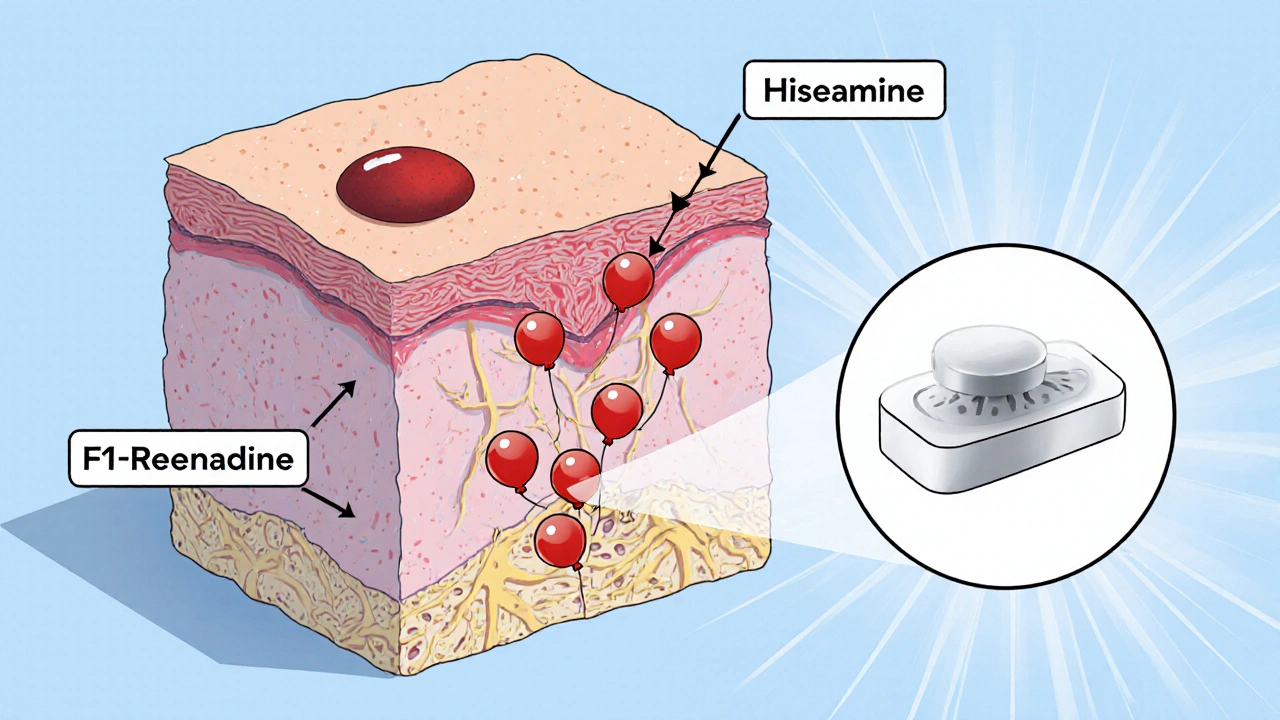Fexofenadine Dosage Calculator
Fexofenadine Dosage Calculator
This calculator helps determine the appropriate fexofenadine dosage for insect bite relief based on age and weight. Always consult your healthcare provider for personalized medical advice.
Quick Summary
- Fexofenadine is a second‑generation antihistamine that blocks histamine receptors without causing drowsiness.
- It can reduce itching, redness, and swelling caused by insect bites, but it works best for allergic‑type reactions.
- Typical adult dose is 180mg once daily; children 12kg‑30kg can use 30mg twice daily.
- Side effects are rare but may include headache or mild stomach upset.
- Topical treatments (hydrocortisone, cool compresses) often complement oral antihistamines for faster relief.
What Is fexofenadine?
Fexofenadine is a second‑generation oral antihistamine that selectively blocks the H1 histamine receptor. It was first approved in the United States in 1996 and is sold under brand names such as Allegra. Because it does not cross the blood‑brain barrier in significant amounts, users rarely feel sleepy-a major advantage over first‑generation antihistamines like diphenhydramine.
How Insect Bites Trigger Histamine Release
When a mosquito, tick, or bee pierces the skin, its saliva or venom introduces proteins that the immune system may recognize as foreign. Specialized cells called mast cells release histamine, a signaling molecule that dilates blood vessels and makes nerve endings itchier. The cascade results in the classic red, raised, and itchy bump we call an insect bite.
In most people, the reaction is mild and resolves within a day. In allergy‑prone individuals, the histamine surge can be larger, leading to prolonged itching, noticeable swelling, and sometimes even hives around the bite site.

When fexofenadine Can Help
If you notice that an insect bite feels unusually itchy, stays red for more than 24hours, or is accompanied by a hive‑like rash, an oral antihistamine can calm the immune response. Fexofenadine works by binding to the H1 receptor, preventing histamine from delivering its “itch” signal.
Typical scenarios where fexofenadine is effective include:
- Persistent itching that interferes with sleep or daily activities.
- Swelling that extends beyond the immediate bite area.
- Multiple bites that trigger a systemic allergic reaction (e.g., widespread hives).
For a simple, isolated bite with mild redness, a topical remedy or cool compress may be enough, and taking an oral antihistamine could be unnecessary.
Dosage, Safety, and Who Should Avoid It
Standard dosing guidelines are:
- Adults and children 12years and older: 180mg once daily (or 60mg three times daily).
- Children 6‑11years (12kg‑30kg): 30mg twice daily.
The medication is best taken with water, and food does not significantly affect absorption. However, fruit juices (especially grapefruit, orange, or apple) can reduce its bioavailability, so avoid taking fexofenadine with these drinks.
Common side effects are mild:
- Headache
- Dry mouth
- Stomach discomfort
Serious reactions such as heart rhythm changes are extremely rare but have been reported in patients with severe kidney impairment. People with known hypersensitivity to fexofenadine or any of its ingredients should not use it.
How Fexofenadine Stacks Up Against Other Antihistamines
| Medication | Generation | Typical Dose for Adults | Onset of Relief | Sleepiness Risk |
|---|---|---|---|---|
| Fexofenadine | Second | 180mg once daily | 30‑60min | Low |
| Cetirizine | Second | 10mg once daily | 30‑45min | Low‑moderate |
| Diphenhydramine | First | 25‑50mg every 4‑6h | 15‑30min | High (sedation) |
If staying alert is crucial-say, you’re on a camping trip-fexofenadine or cetirizine are better choices than diphenhydramine. Cetirizine may cause mild drowsiness in up to 10% of users, while fexofenadine’s sedation rate is under 3%.

Other Ways to Ease Insect Bite Discomfort
Combining oral antihistamines with topical care speeds recovery. Effective options include:
- Hydrocortisone cream 1% applied 2‑3 times daily to reduce inflammation.
- Calamine lotion for soothing itch and drying out weeping lesions.
- Cold compresses for 10‑15minutes to constrict blood vessels and blunt the itch signal.
- Aloe‑veranda gel for moisturizing and mild anti‑inflammatory action.
For people with severe allergy histories, an epinephrine auto‑injector may be prescribed as a precaution, especially after bee or wasp stings.
Quick Checklist Before You Take Fexofenadine
- Confirm that itching or swelling is due to an allergic‑type reaction, not infection.
- Check if you’re taking any fruit juices that could lower absorption.
- Review your kidney function if you have chronic kidney disease.
- Consider your need to stay alert; choose a second‑generation antihistamine if drowsiness is a concern.
- Read the label for other active ingredients (e.g., lactose) that may affect tolerability.
Frequently Asked Questions
Can I take fexofenadine for a single mosquito bite?
If the bite is only mildly itchy and the redness fades within a day, a topically applied cream or a cool compress is usually enough. Oral fexofenadine is more useful when itching is intense, lasts longer than 24hours, or is accompanied by swelling.
How quickly will fexofenadine start working?
Most people notice reduced itching within 30‑60minutes after the first dose. Full anti‑histamine effect can take up to 2hours, especially if taken on an empty stomach.
Is fexofenadine safe for children?
Yes, children weighing 12‑30kg can safely take 30mg twice daily. For younger kids, a pediatrician may recommend a liquid formulation or an alternative antihistamine.
Will fexofenadine make me drowsy?
Because it is a second‑generation antihistamine, the risk of sedation is low (under 3% of users). If you notice any unwanted sleepiness, switch to an alternative like cetirizine or discuss dosage adjustments with a pharmacist.
Can I take fexofenadine with other allergy medicines?
Mixing two oral antihistamines generally offers no added benefit and may increase side‑effects. However, using fexofenadine together with a topical corticosteroid (e.g., hydrocortisone) is safe and often recommended for stubborn bites.


darwin ambil
October 15, 2025 AT 13:13Fexofenadine works like a charm for those itchy bites! 😊
Kelvin Van der Maelen
October 15, 2025 AT 15:30If the bite isn’t swollen, stop popping pills.
BJ Anderson
October 15, 2025 AT 17:43When the itch keeps you up at night, a non‑drowsy antihistamine like fexofenadine is a solid rescue. It blocks H1 receptors so the itch signal never reaches the brain. You’ll notice the relief within half an hour, and the swelling starts to shrink. Just make sure you take it with water, not juice, or the dose won’t be absorbed fully. It’s cheap, over‑the‑counter, and you won’t feel groggy the next day.
Alexander Rodriguez
October 15, 2025 AT 19:56Standard adult dosing is 180 mg once daily, or 60 mg three times a day, while children 6‑11 kg can use 30 mg twice daily. Avoid grapefruit, orange, or apple juice because those acids cut the drug’s bioavailability. Side effects are limited to mild headache, dry mouth, or stomach discomfort. Serious cardiac events are extremely rare and usually linked to severe kidney disease.
Abhinav Sharma
October 15, 2025 AT 22:10From an immunological perspective, the bite injects foreign proteins that trigger mast cells to dump histamine. By occupying the H1 receptors, fexofenadine essentially puts a “do not disturb” sign on those nerve endings. It’s especially useful if you have a history of allergic reactions to insect venoms. Pairing it with a cool compress speeds up vasoconstriction, which further dampens the itch. Remember, topical steroids like hydrocortisone can handle localized inflammation, but the systemic itch often needs the oral route.
Welcher Saltsman
October 16, 2025 AT 00:23Got a nasty bite on a camping trip? Take fexo and keep moving dont let the itch slow you down
april wang
October 16, 2025 AT 02:36Fexofenadine has become a go‑to option for many people dealing with persistent insect bite symptoms. The drug’s second‑generation profile means it stays out of the central nervous system, so you stay alert while the itch fades. When you apply it after a bite, the antihistamine begins to occupy the H1 receptors within 30 minutes, cutting down the histamine‑driven itch cascade. This early blockade helps prevent the swelling from expanding beyond the immediate bite area. In practice, you’ll notice the red bump flattening and the sensation of crawling ants under the skin diminishing. For those who are sensitive to drowsiness, the low sedation rate-under three percent of users-makes it a safer alternative to diphenhydramine. The dosage guidelines are straightforward: 180 mg once a day for adults, or split into three 60 mg doses if you prefer a steadier plasma level. Children weighing between 12 and 30 kg can safely take 30 mg twice daily, but younger kids should be evaluated by a pediatrician. Food does not significantly affect absorption, but fruit juices, especially grapefruit, orange, and apple, can reduce the drug’s effectiveness, so it’s best to take the tablet with plain water. Common side effects such as mild headache or dry mouth are usually transient and resolve without intervention. Serious adverse events are extremely rare and are typically linked to pre‑existing kidney impairment. If you have chronic kidney disease, a dose adjustment or alternative therapy may be warranted. Combining fexofenadine with a topical steroid like 1 % hydrocortisone can provide both systemic and local relief, accelerating recovery. Cold compresses applied for ten to fifteen minutes can further constrict blood vessels, adding a mechanical component to the anti‑itch strategy. In summary, for bites that cause intense itching, swelling beyond the bite margin, or systemic hives, fexofenadine offers a well‑tolerated, non‑sedating solution that fits easily into a weekend outdoor routine.
Franco WR
October 16, 2025 AT 04:50It’s worth noting that the timing of the dose can influence how quickly you feel better; taking fexofenadine on an empty stomach may speed up absorption, but the difference is modest. Some users report that a second dose later in the day helps when the bite re‑awakens after the first dose wears off, especially with multiple bites. The drug’s half‑life is about 14 hours, so the effect can linger into the next day, providing continuous protection if you’re exposed to more insects overnight. While the medication is generally safe, people with severe kidney disease should consult their doctor before starting, as the drug is eliminated renally. For those who are lactose intolerant, checking the inactive ingredients is advisable, as some formulations contain lactose. If you experience any unexpected dizziness or heart palpitations, discontinue use and seek medical advice promptly. Overall, fexofenadine presents a balanced profile of efficacy and safety for most bite‑related itching scenarios.
Rachelle Dodge
October 16, 2025 AT 07:03Sting drama? Fexo tames that fiery itch instantly.
Gaurav Joshi
October 16, 2025 AT 09:16In the context of outdoor activities, having a non‑sedating antihistamine on hand is a pragmatic choice; it lets you stay alert while minimizing discomfort.
Elaine Proffitt
October 16, 2025 AT 11:30Fexo works fast it stops itch without making you sleepy
Christopher Munt
October 16, 2025 AT 13:43Got a bite? Pop a fexo and get back to the fun! 🙌
tony ferreres
October 16, 2025 AT 15:56Stop relying on weak creams; if you want real relief you need a proper H1 blocker now.
Kaustubh Panat
October 16, 2025 AT 18:10One must recognize that the pharmacodynamic superiority of second‑generation antihistamines over their first‑generation counterparts is not merely a matter of reduced sedation but reflects a nuanced understanding of receptor selectivity and blood‑brain barrier permeability, which simplistic over‑the‑counter narratives often obscure.
Arjun Premnath
October 16, 2025 AT 19:16That’s a solid point; for anyone unsure, choosing a drug with targeted action and minimal central effects is the wise route.